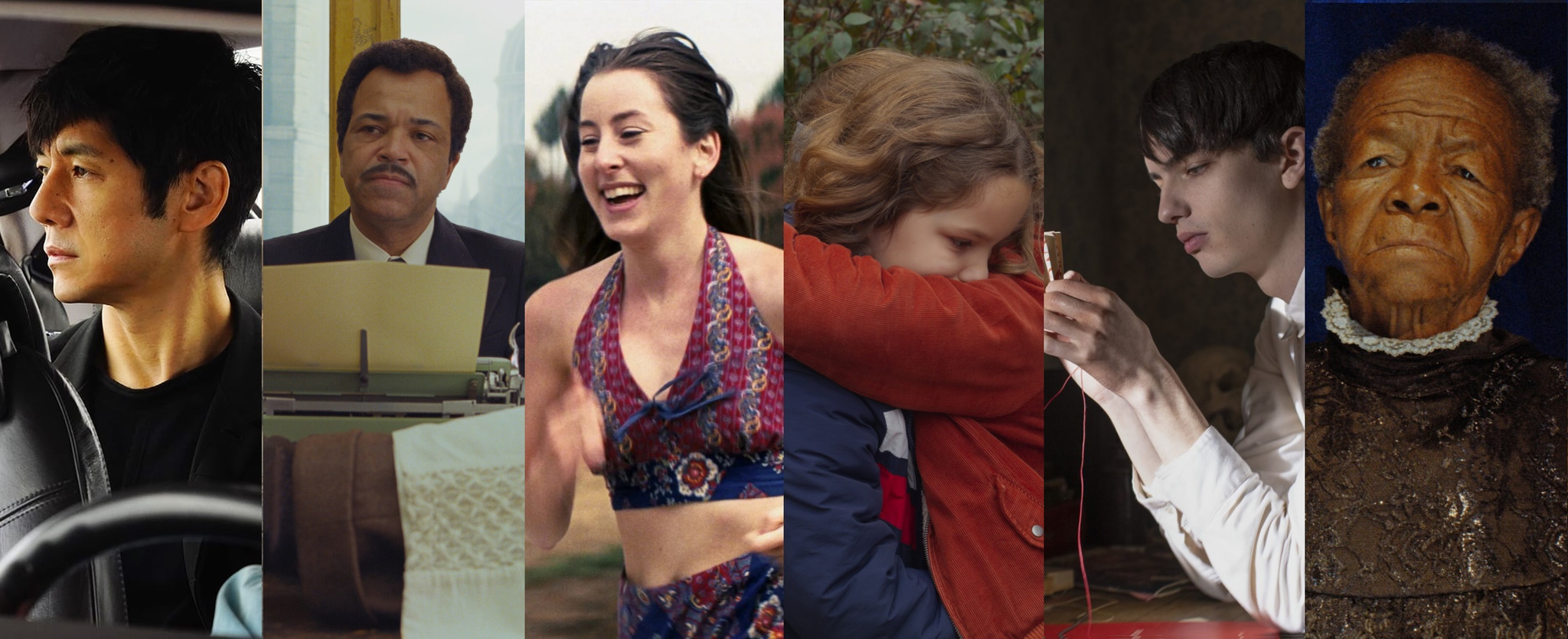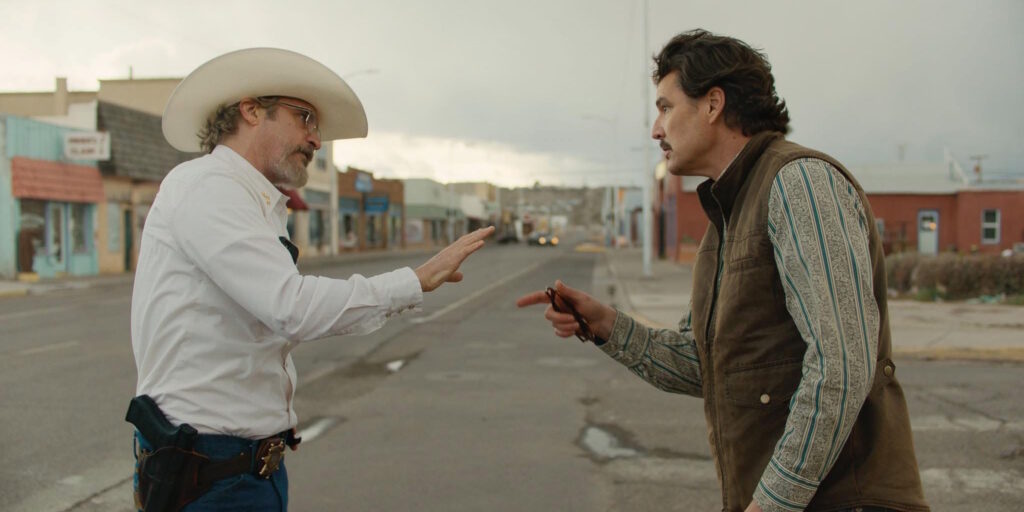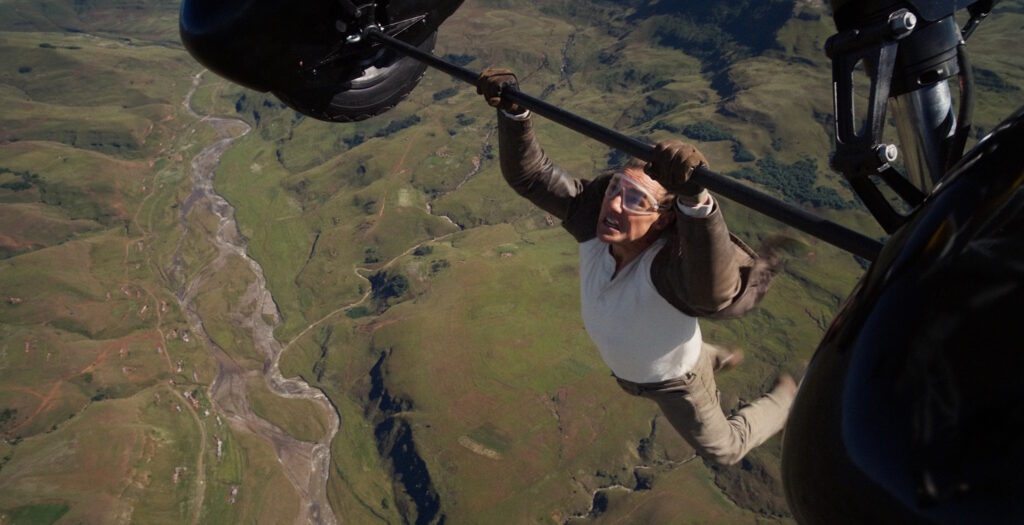2021 was a weird one. After the logistical, societal, and personal upheavals of 2020, it was supposed to be the year when everything returned to normal. Except it didn’t – or perhaps this is just the new normal? As Covid-19 ebbed and surged, multiplex and arthouse theaters both continued to struggle with attendance, the fortunes of the former held afloat by a handful of blockbuster franchise entries. Film festivals and other public events experimented with various in-person, virtual, and hybrid formats. There was predictable but largely pointless hand-wringing (and, bizarrely, rejoicing) about the box-office failure of this or that high-profile feature. Pandemic-related exhaustion seemed to be wearing on everyone: Every week the dreaded Film Discourse seemed smugger, testier, and more enervating, right to the year’s bitter end.
And yet 2021 proved to be a surprisingly rewarding year for cinephiles who had the motivation and wherewithal to seek out the features that excited and intrigued them. Although a few wide-release films reverted to the “theatrical only” model, most of the year’s best works arrived via a constellation of distribution strategies: theatrical openings, one-off screenings, virtual cinemas, streaming outlets, video-on-demand platforms, and various combinations of the same. Being an enthusiastic movie lover in 2021 required one to be flexible and adventurous – and often cautious – but the prize for such dedication was an embarrassment of cinematic riches.
We’re doing something a little different this year with our “Best of the Year” feature. Instead of countdowns, we’re experimenting with a single unranked list of our favorite 2021 films, reflecting the collective input of our regular contributors. We’ve kept it simple: Just a curated list of 30 films that we loved – and how you can watch each one. For further reference, each contributor’s personal rankings for the year are presented at the end of the article. For the purposes of this piece, a “Film of 2021” is a feature that had an Academy Award-qualifying theatrical opening, a local festival premiere, or an exclusive online premiere (virtual cinema, streaming, or VOD) between Jan. 1 and Dec. 31, 2021.
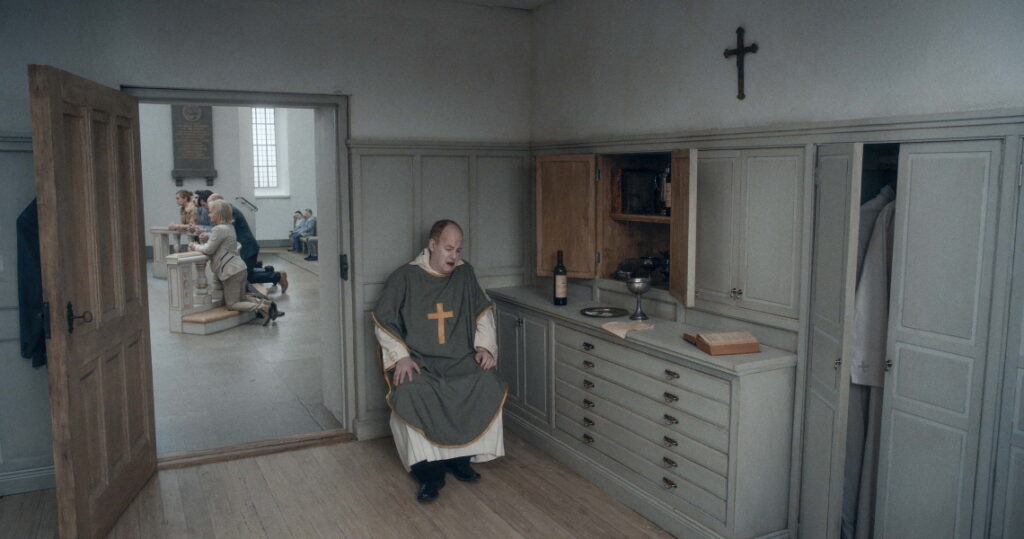
About Endlessness
A skeptic might assert that director Roy Andersson has remade his breakout 2000 feature Songs from the Second Floor three times, iteratively refining his now-inimitable formal approach: absurd, unhurried vignettes directed with a fussiness that would make Wes Anderson blush. For those who vibe with the celebrated Swedish filmmaker’s existentialist wit and stunning visuals, however, his latest feature, About Endlessness, feels like a culmination of two decades of defiantly uncommercial auteurism. Maybe it’s simply that Andersson’s gallows humor and ashen, reality-adjacent purgatories land that much harder in our present pandemic-defined era. Or maybe the rest of us are finally catching up to the filmmaker’s tragically ludicrous (and ludicrously tragic) view of the human experience. (Andrew Wyatt) [Now available to stream on Hulu and to rent on major online platforms.]
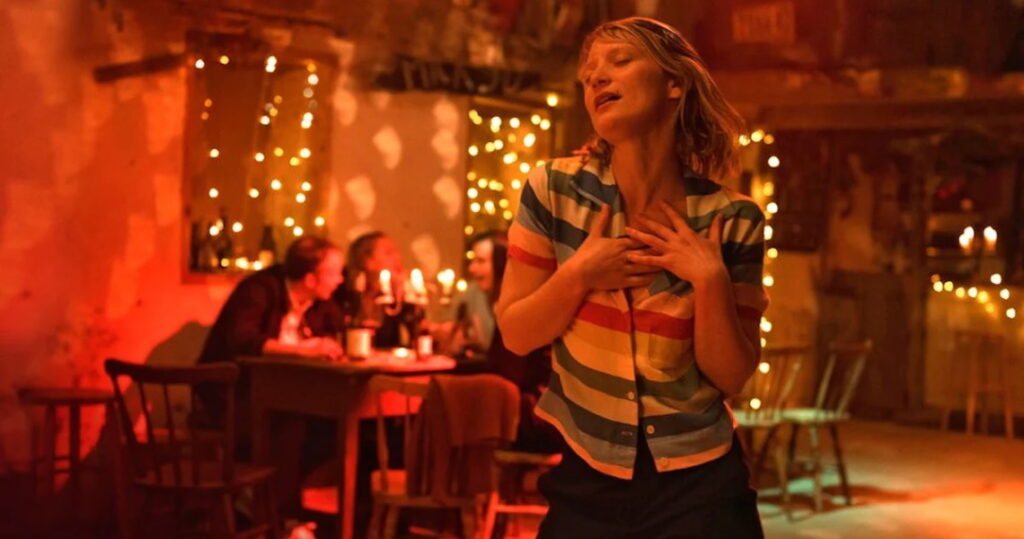
Bergman Island
For better or worse, Mia Hansen-Løve is uniquely attuned to the rhythms of everyday life, whether that’s one of French house DJs in the ’90s (Eden, the better) or young women with their heads over their heels (Goodbye First Love, worse). With relatively known stars Vicky Krieps, Mia Wasikowska, and Tim Roth, her latest finds the writer-director at her most polished yet, but she’s still in the languorous weeds with the tourists – myriad meanings of the word abound – on Bergman Island. Like Julie in Joanna Hogg’s The Souvenir: Part II, projecting Hansen-Løve’s own history on the narrative of her filmmaker protagonist (Krieps) is nearly impossible not to do, especially when the character does so with her very own female protagonist (Wasikowska). Self-disclosing and -reflexive or not, Bergman Island is nevertheless steadfast in revealing how difficult living in the shadow of “great” men can be, but that others can just as easily eclipse them, given the opportunity. (Joshua Ray) [Now available to rent from major online platforms.]

Cusp
Taking place over the course of one nightmarish hallucination of a summer, Cusp shows the dark underbelly of small-town America to which young teenage girls are all too often exposed. Shot in vérité style by first-time directors Isabel Bethencourt and Parker Hill, Cusp forgoes the typical talking-head interviews and frightening statistics so often used to sway the audience, instead presenting its footage without adornment. This results in an unforgettably raw documentary that is far more impactful than any buzzwords or figures could ever be. Subjects Autumn, Brittney, and Aaloni are almost constantly caught in dangerous situations — whether or not they’re aware of the threat they face while partying deep in the woods or out on dates with much older, nefarious men — but Bethencourt and Hill maintain their unflinching fly-on-the-wall perspective through it all. The directors intercut their footage with achingly beautiful shots of sunset and nature, which serves as a silver lining of sorts, a visual representation of the beauty and the hope that lies in the dreams of the girls who long to escape the pain of their hometown. The depravity depicted here is not exclusive to Texas. It’s happening in every rural area across the nation. (Kayla McCulloch) [Now available to stream on Showtime.]

Days
It feels a bit strange to describe the latest feature by the great Taiwanese filmmaker Tsai Ming-liang as “accessible,” given that it opens with a wordless, five-minute shot of a man staring sadly at the rain. However, for all its exquisite slow-cinema indulgence, Days tells a relatively straightforward story about consuming loneliness, unexpected connection, and the bittersweet taste of a cherished memory – concepts to which any viewer can relate. Simply but brilliantly constructed around an erotic encounter brimming with aching tangibility, Tsai’s film serves as a melancholy reflection on modern alienation, but also a poignant depiction of the mundane pleasures and shimmering inflection points that make life slightly more bearable. (Andrew Wyatt) [Now available to stream on MUBI.]

Drive My Car
Petite Maman, In the Same Breath, The Power of the Dog, The French Dispatch, Pig, and Procession are just a few of the cinematic expressions of grief released in 2021. Ryûsuke Hamaguchi’s Drive My Car may belong in this group, but the instant classic is unique in the way the writer-director gently shepherds both characters and viewers right into the void created from unfathomable loss. He guides their hands along its curves and contours in order to discern its shape. The space is enclosed but breathable, stifling and airy at the same time. Each inhalation they take contains scents that recall memories. Artfully dodge these ricocheting images they might, but he confidently nudges them into receiving and processing instead of deflecting. The ever-evolving work to understand this mammoth thing can only be done by putting their hands on 10 and 2, buckling its seatbelt across their chests, and adjusting its rearview mirrors to their sights. Finally, Hamaguchi tosses them the keys and lets them take control. It takes practice to navigate bumps in the road and to interpret the confusingly marked detours. Most importantly, the view from the driver’s seat reveals tire tracks left behind on the road’s surface. Others are on the same journey, and that’s somehow reassuring. To paraphrase Uncle Vanya, as the director does so expertly here: What else can they do? They must live their lives. (Joshua Ray) [Screening Jan. 6 – 9 and 13 – 16 at the Webster University Film Series.]
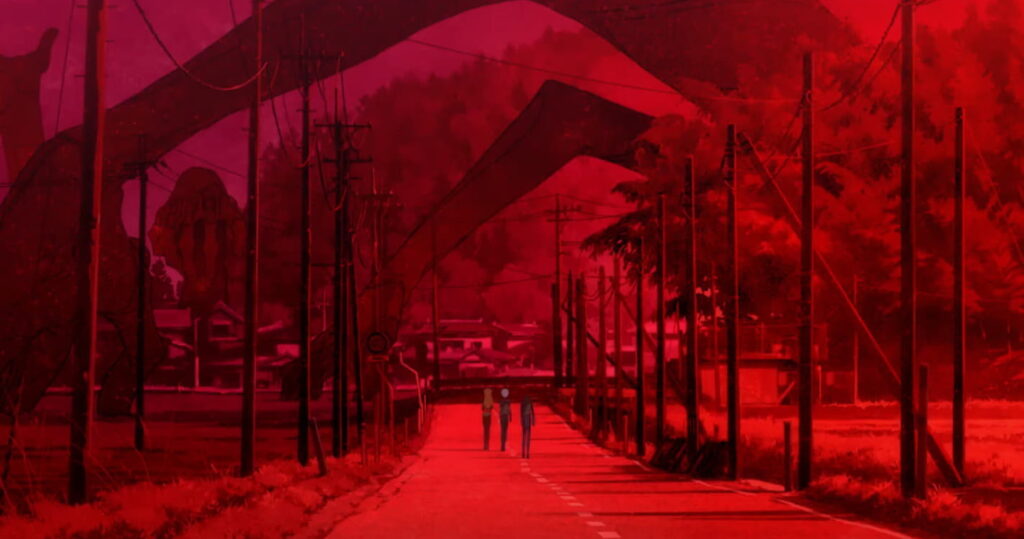
Evangelion: 3.0+1.0 Thrice Upon a Time
The best action film of 2021 is buried on a streaming service in a subsection most will hop over if it isn’t already the last on their screens (Amazon Prime>Anime). Evangelion: 3.0+1.0 Thrice Upon a Time isn’t an easy sell to begin with, being the final entry of a quadrilogy of anime films that’s actually the second iteration of an immensely popular if niche anime and all. (Or third iteration, as its title implies, after the other great Evangelion film, The End of Evangelion, rewrote its origin’s ending in 1997.) With this mind-bending and heart-rending curtain call on his Evangelion “rebuild” series and the property as a whole, the great anime philosopher Hideaki Anno gets to play in his vast sandbox one more time, placing his mechas in rollicking star wars to rival Lucas’ and their pilots in existential stargates to rival Kubrick’s. (Joshua Ray) [Now available to stream on Amazon Prime.]
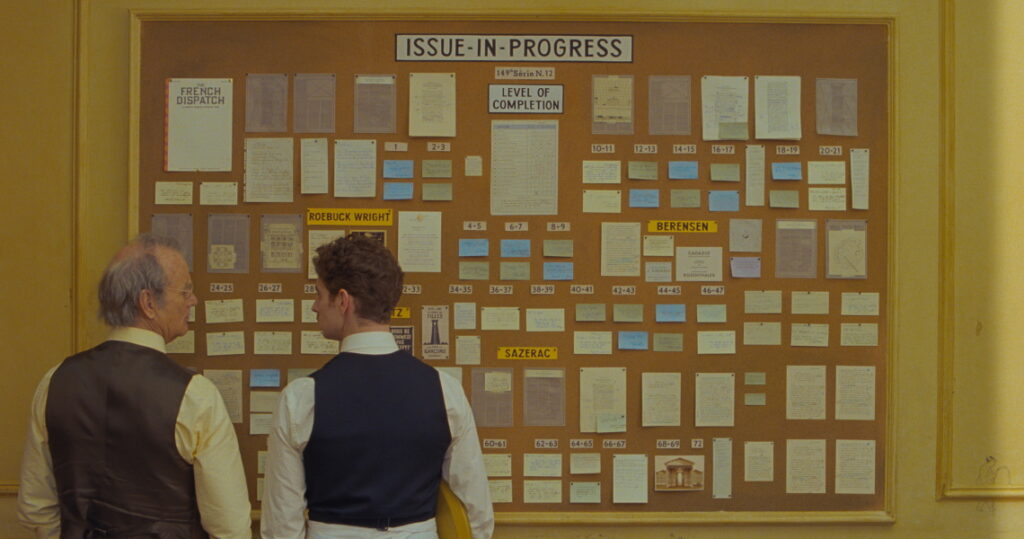
The French Dispatch
After the release of The Grand Budapest Hotel (2014), fans of Wes Anderson wondered how the director could possibly top what was obviously his most distinctive work by far. When he followed up the film with Isle of Dogs (2018) — an animated (and some might say derivative) project in the same vein as one of his most lauded earlier works, Fantastic Mr. Fox (2009) — many turned from wondering to fearing that Anderson might have hit his peak. The French Dispatch, Anderson’s latest and easily one of his strongest, squashed these fears with a resounding stomp. Split into several sections like a magazine, The French Dispatch unfolds in a series of vibrant, star-studded shorts that grapple with some of the most mature themes Anderson has ever touched on — and with some of the most striking compositions of his filmography, to boot. It was touch and go for a second there, but there is now little doubt: Wes Anderson’s still got it, and The French Dispatch is the proof. (Kayla McCulloch) [Now available to rent on major online platforms.]
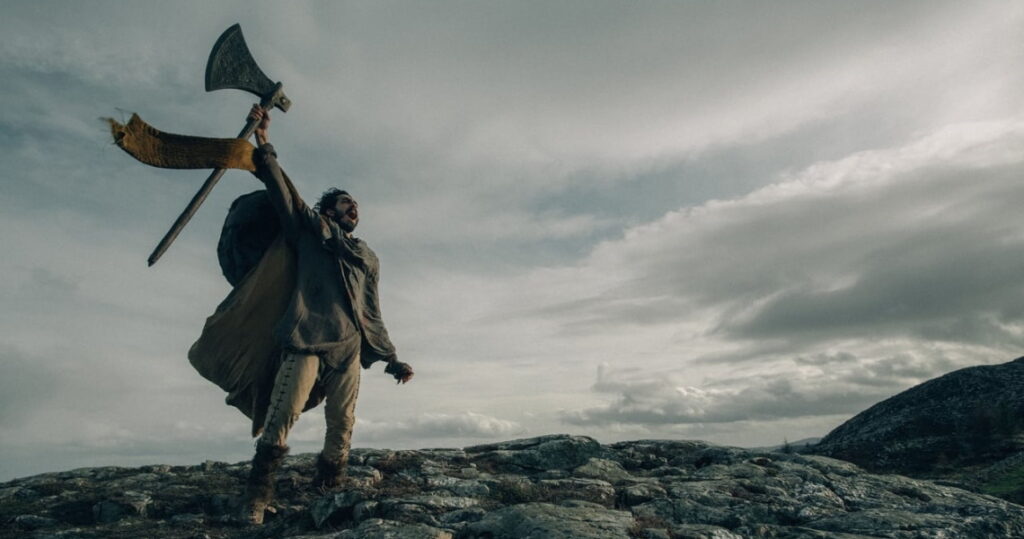
The Green Knight
Evincing a wild, visionary confidence matched by few filmmakers this year, director David Lowery transforms a 14th-century chivalric romance into the stuff of pure cinema, at once mythic and modern. Dev Patel shines as a knight of anxious ambition who journeys outward into a surreal mythic Britain to find his destiny on the edge of a pagan godling’s ax. The Green Knight is wall-to-wall with sensory splendors, but it’s also deeply cerebral, serving as a shivery rumination on honor, identity, and self-knowledge. The fact that Lowery concludes his psychedelic epic with a bravura, wordless flash-forward that constitutes one of the best scenes of 2021? Well, that’s just the icing on the cake – or the goo on the magic girdle, if you prefer. (Andrew Wyatt) [Now available to rent on major online platforms.]
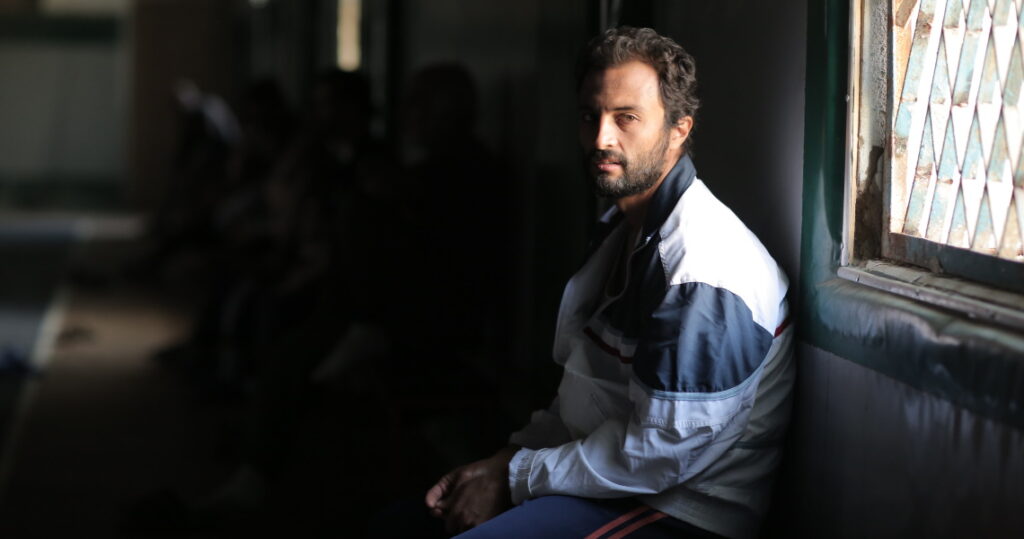
A Hero
A new Asghar Farhadi film is always cause for celebration, but this is especially true when that new Farhadi film is as remarkable as A Hero. Not since his first Oscar-winning A Separation (2011) has the Iranian filmmaker been so on the ball: The melodrama is finely wrought, its twists and turns never feel unwarranted or unrealistic, and its firm emotional core drives home the moral of the story like a punch to the gut. Not to mention, Farhadi’s commentary on Iran’s prison system and capital punishment at large feels especially sharp when seen through the lens of American mass incarceration. Farhadi has truly outdone himself this time around, cementing his status as one of the 21st century’s most superb dramatists. (Kayla McCulloch) [Opening today in select local theaters and available to stream on Amazon Prime on Jan. 21.]
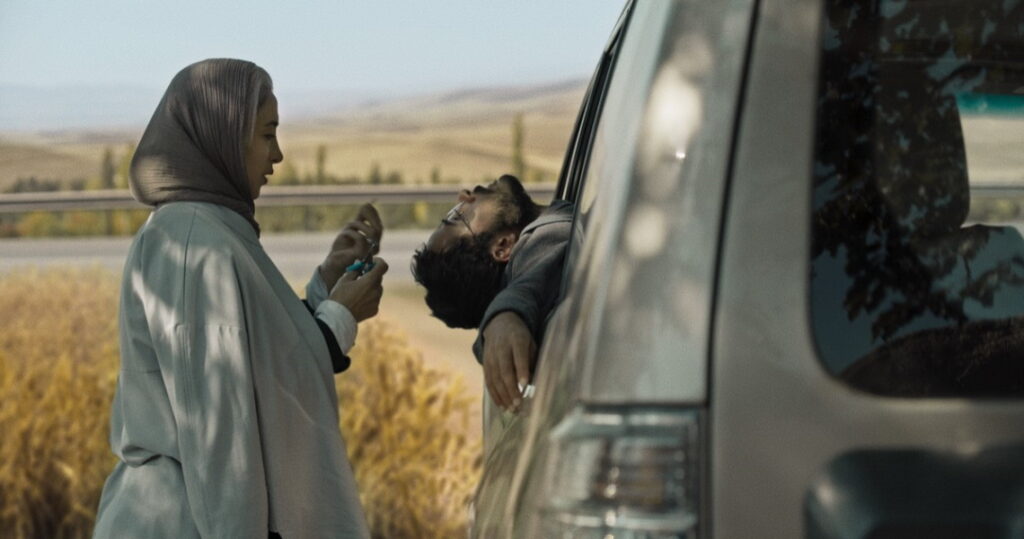
Hit the Road
In a year with no shortage of great Iranian films, director Panah Panahi’s magnificent, dryly comic debut feature stands out as a singular achievement. Elaborating on his filmmaker father Jafar’s droller inclinations, Hit the Road finds the younger Panahi envisioning a desperate flight from authoritarian oppression as a fable about an absurd family road trip, one liberally drizzled with magical realism and anguished emotionality. Equal parts Samuel Beckett and Daniel Clowes, Panahi’s film deftly balances a multitude of tones as it wrestles with questions of duty, loss, and secrecy – backed by a vintage Persian pop soundtrack that infuses even the darkest moments with an eccentric tenderness. (Andrew Wyatt) [Available soon to rent or purchase.]
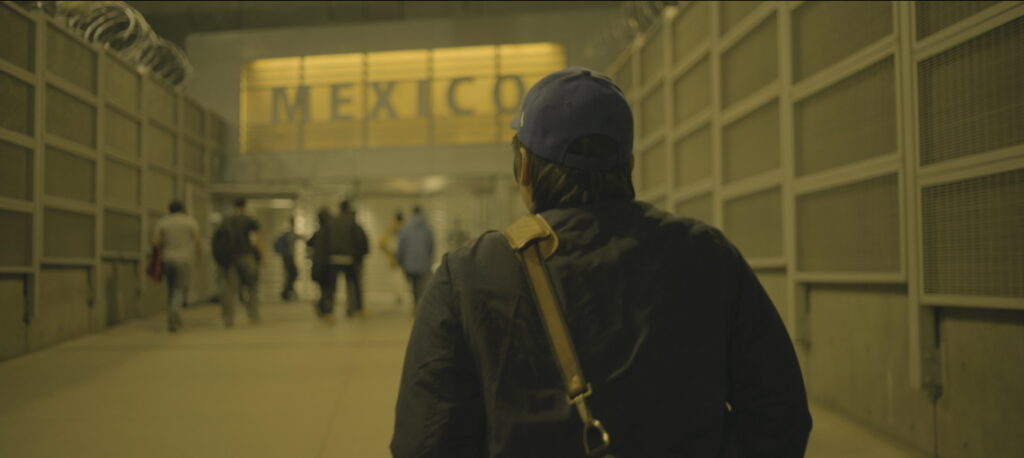
Identifying Features
Mexican filmmaker Fernanda Valadez’s astonishing debut feature curls forth from the darkness of cartel country like a demonic flame, announcing a new cinematic talent in the tradition of John Ford, David Lean, and Sergio Leone. Following a pair of intersecting journeys – a mother’s indefatigable search for her missing son and a deported man’s defeated trek homeward – Valdez’s film reveals itself as a vivid, resonant neo-Western about fear, grief, and the glimmering endurance of hope in the face of senseless, annihilating evil. Except – maybe hope isn’t enough. Maybe, Identifying Features suggests ominously, some truths are better off buried in the dust and ashes. (Andrew Wyatt) [Now available to rent on major online platforms.]

In the Same Breath
As dual and dueling portraits of Nanfu Wang’s home countries, the Peoples’ Republic of China and the United States of America, and their initial responses to the Covid-19 crisis, In the Same Breath is unadorned reportage that, in its margins, also works as a personal essay. In her latest feature, the documentarian poses to herself the question many around the world are (or should be) currently asking themselves: How do you negotiate deep-seated national pride with the horror perpetrated by that very institution? With all-too-rare footage from the frontlines of the pandemic and its origins in the Wuhan province, In the Same Breath is an urgent document that reveals how both truth and illusion can come at 24 frames per second. (Joshua Ray) [Now available to stream on HBO Max.]
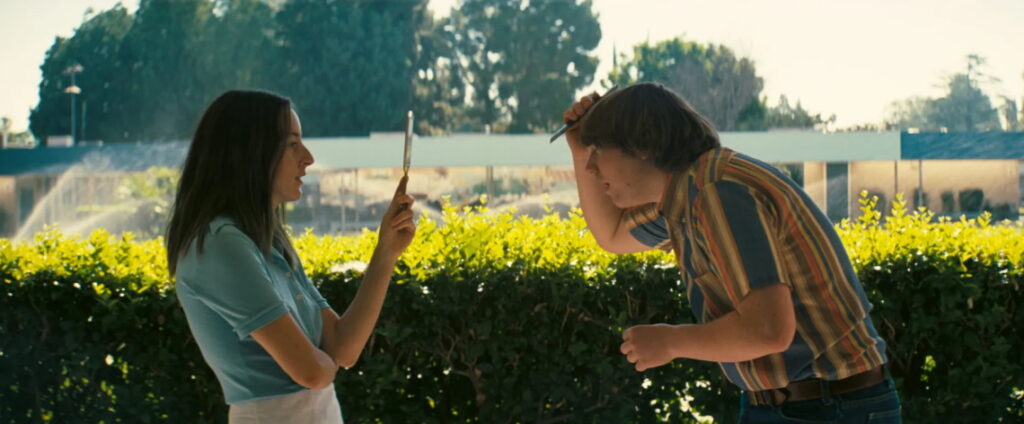
Licorice Pizza
Paul Thomas Anderson and Haim sisters Danielle, Alana, and Este have been collaborating on music videos for the eponymous pop-rock girl group since 2017, but Licorice Pizza — PTA’s newest comedy and his most emphatic tribute to 1970s California since Boogie Nights (1997) — is the first time Anderson has recruited the incredibly talented ladies for a project of his own, rather than the other way around. Whether it’s due to the camaraderie the quartet has developed over the past few years, the knack Anderson has for evoking great performances out of unexpected places (see: Adam Sandler in Punch-Drunk Love [2002], Mark Wahlberg in Boogie Nights), or simply the strength of Anderson’s screenplay, Licorice Pizza is an absolutely delightful work, reminiscent of the finest films of the New Hollywood era while still remaining very much its own thing. Pay no mind to the bad-faith criticisms and poor readings of the film: PTA just doesn’t miss. (Kayla McCulloch) [Now playing in select local theaters.]
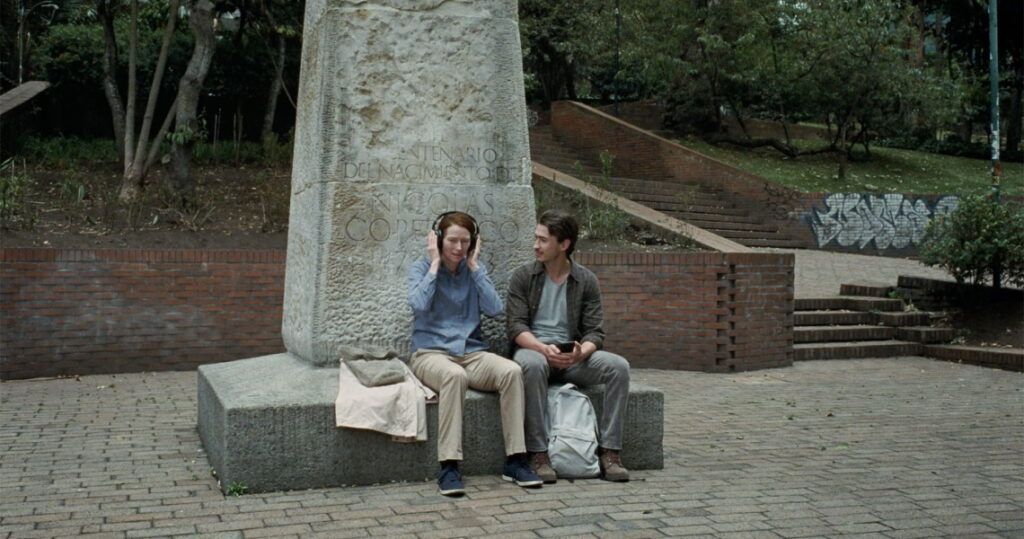
Memoria
She’s an antenna. Typing that three-word sentence feels like letting the cat out of the bag for Apichatpong Weerasethakul’s Memoria. However, this cat has infinitely many lives and a bag that’s a prismatic, oneiric experience that is utterly unspoilable. The North American distribution strategy for the Thai master’s latest has made it even more rarefied (and if Neon has its way, commodified) since the Tilda Swinton vehicle will play exactly one big screen at a time in perpetuity, without any plan for a home-media release. It’s a marketing ploy and an obtuse thesis: Other adventurous antennae set themselves to receive its looping airwaves, tuning into its metaphysical frequencies sent out like a beacon of hope from the past and the future as it moves through time and space with singularity. “Joe” – the nickname given to Weerasethakul by his English-speaking friends, and it’s hard not to see him as one when his work feels like a hand outreached – has made an art film for the ages, and its timelessness is exactly the point. (Joshua Ray) [Now playing in exclusive, single-screen engagements.]

Parallel Mothers
Pedro Almodóvar has never been shy about his place within his narratives – so much so that the death-haunted director at the center of Pain and Glory, his feature previous to Parallel Mothers, wears the trademark gray-spiked Almodóvar ’do. They are born from him, and they contain just as much of his DNA as that of the artists who inspired him, including Tennessee Williams, García Lorca, Alfred Hitchcock, and Douglas Sirk, to name a few. The popular Spanish auteur’s latest is also his first to expressly grapple with his birth country’s violent path to democracy, one that paved the way for the iconoclast’s melodramas to be made and seen. The web of truth and illusion he weaves begs a mother (Penelope Cruz, who’s never better than under the direction of her frequent collaborator) to confront her culpability in perpetuating tragedy and trauma. Perhaps the other half of his title’s twinned matriarchs isn’t supposed to be taken as literally as the complex baby-swap plot suggests. By its end, he’s also pleading for his Motherland to do exactly the same kind of soul-searching reckoning. (Joshua Ray) [Opens in select local theaters on Jan. 21.]
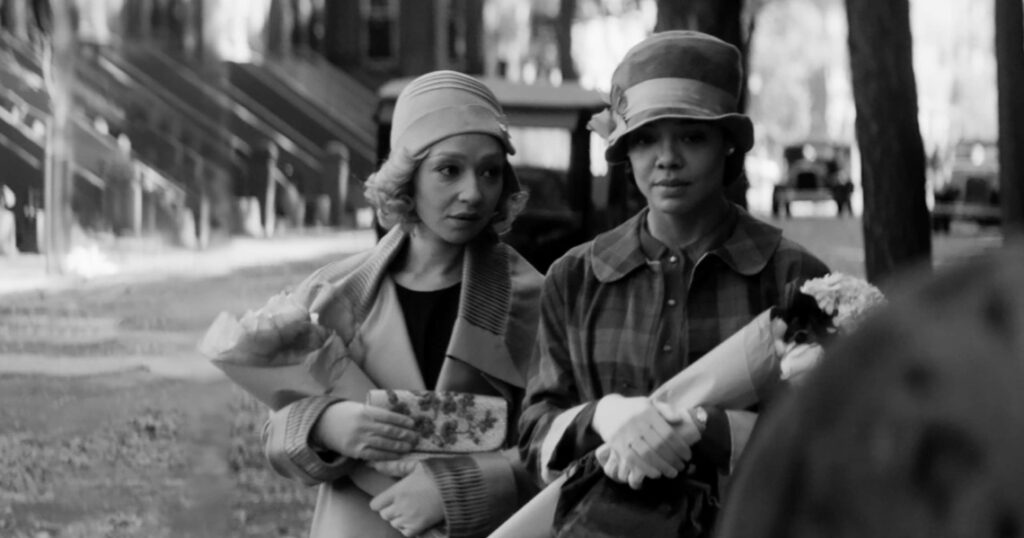
Passing
Rebecca Hall’s outstanding feature debut elegantly transcends the often-stifling conventions of awards-baiting dramas about Very Serious Issues, delivering an agonized but formally dazzling tale of race, class, and gender. Anchored by a pair of astonishing, richly nuanced portrayals from Tessa Thompson and Ruth Negga, Passing watches in mute, restless dismay as two old friends reunite in 1920s Harlem and reckon with the choices they’ve made. The performances are riveting, but it’s the sheer artistry of Hall’s canny adaptation that truly sinks its teeth into the viewer: The redolent evocation of a distant time and place where the poisoned promise of America nonetheless feels all too recognizable. (Andrew Wyatt) [Now available to stream on Netflix.]
Petite Maman
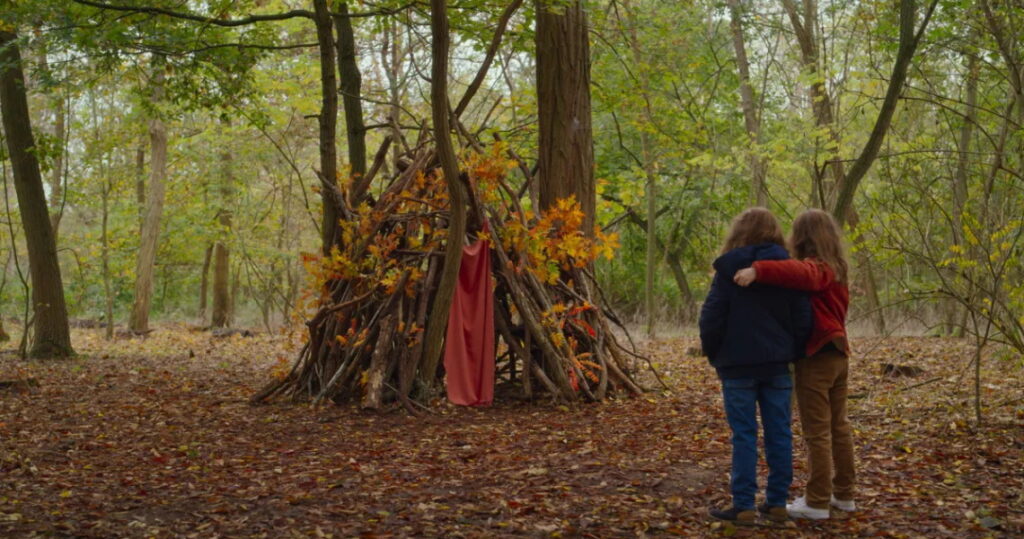
There’s a blue tin in Nelly’s (Joséphine Sanz) recently deceased grandmother’s closet. The former butter-cookie container goes unmentioned by her and her mother (Nina Meurisse in the present, Gabrielle Sanz in the “past”), but the box is still noticeable. Perhaps it’s because almost every mother has this same tin – an object worth discarding but one they tend to use as their sewing kit, as if they were gifted it that way the moment their children were born. Like all her films, Céline Sciamma’s latest is gracefully brimming with these minute textural choices, and the resulting mosaic of them is enriched by their specificity. They’re so specific, they become universal, and therefore one could almost smell Petite Maman for its verisimilitude toward shared memories. As if that magic trick weren’t enough, Sciamma also opens a door to the past that’s typically sealed shut and manages to explicate lifetimes within the mere 72 minutes that make up her petite masterpiece. P.S.: For the record, Petite Maman smells like lilac, damp forest, dusty paperbacks, and butter mixed with vanilla and sugar, possibly from stale cookie crumbs. (Joshua Ray) [Available to stream on MUBI on Feb. 4.]
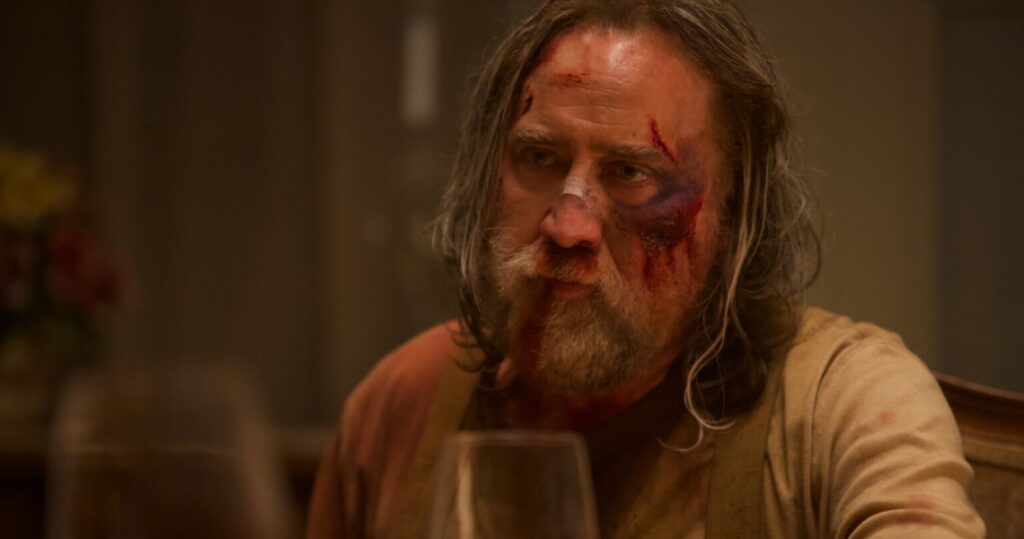
Pig
Director Michael Sarnoski’s captivating feature served up the greatest cinematic fake-out of the year. It promised us that a characteristically unhinged Nicolas Cage would embark on a John Wick-style rampage for his missing porcine friend. Instead, Pig delivered a sober, plaintive meditation on passion, integrity, and remembrance. “We don’t get a lot of things to really care about,” observes Cage’s chef-turned-truffle hunter, in what amounts to a blunt statement of ethos from Sarnoski’s sublimely poignant debut feature. A darkly blissful concoction bursting with unexpected tonal and emotional twists, Pig proved to be one of the genuine surprises of 2021, a feat assisted in no small part by a career-best performance from Cage. (Andrew Wyatt) [Now available to stream on Hulu and to rent on major online platforms.]
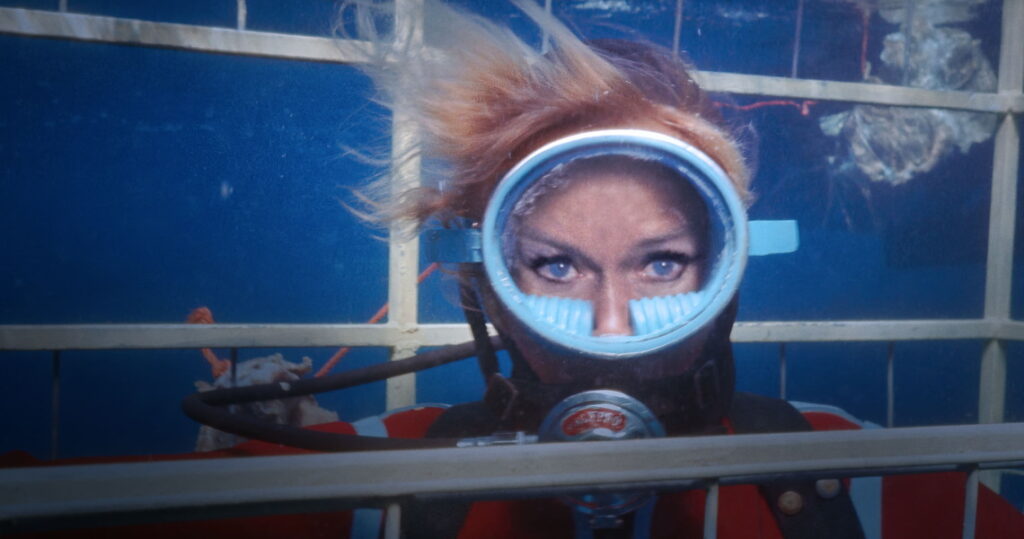
Playing with Sharks: The Valerie Taylor Story
For more than six decades now, Valerie Taylor’s unconventional and contradictory life story has done just as much to defend sharks as it has to perpetuate the damaging myths that surround the ocean’s most notorious predator. Long before she was leading the charge to save them, Taylor was killing sharks. Not only did she participate in spearfishing tournaments that had her harpooning sharks for sport, but she also played an integral role in the production of some incredibly harmful anti-shark films — such as Blue Water, White Death (1971) and Jaws (1975) — before becoming the leading voice in shark-conservation efforts. As complicated as Taylor’s life’s work sounds, director Sally Aitken’s documentary Playing with Sharks: The Valerie Taylor Story meticulously sets everything straight. Aitken manages to paint her subject as both the hero and the villain of her own story, detailing her expertise in spearfishing and her subsequent efforts to put a stop to the barbaric sport, her desire to change the way sharks are perceived by the public, and her later contribution in portraying them as omnipresent homicidal maniacs that will devour anyone who ventures into the dark and deadly sea. Playing with Sharks stands out among the rest of 2021’s biographical documentaries for its willingness to go above and beyond the hagiographic standards of the biodoc subgenre and actually interrogate its subject a bit — and to allow its subject the opportunity to offer up an apology and have a shot at absolution. (Kayla McCulloch) [Now available to stream on Disney+.]
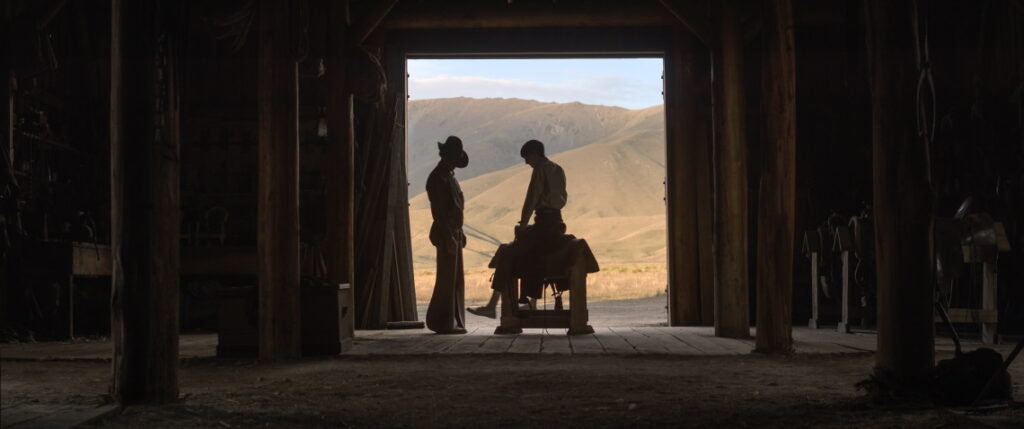
The Power of the Dog
After over a decade away from feature-length filmmaking, the incomparable Jane Campion rides a roaring whirlwind back into theaters (and homes) with her searing, majestic, and fittingly deconstructive take on the American Western. At first glance, The Power of the Dog appears to be a sensitive, sweeping drama about an alpha-male cattle rancher and his callous bullying of a pair of domestic interlopers – i.e., his new sister-in-law and nephew. With its enthralling performances, luminous visuals by Ari Wegner, and characteristically virtuosic direction, one could be forgiven for assuming that Campion had delivered a superb but straightforward genre feature. However, this is the filmmaker who gave us the late-blooming, transgressive stickiness of In the Cut, and in adapting Thomas Savage’s novel she finds a fantastic vehicle for a shocking and at times metatextual exploration of shame, terror, and justice. Watch closely: All the rot is out in the open, but it’s devilishly easy to overlook. (Andrew Wyatt) [Now available to stream on Netflix.]

Procession
 Robert Greene’s revolutionary work in the field of documentary has long captured the attention of those willing to seek out his films, but his latest, Procession, is different. There’s no need to seek this one out, because it’s been given his most accessible release to date. Distributed by Netflix in late November, Procession and its cathartic message of redemption and restoration through collaborative filmmaking deserve to be seen by the masses. Greene and crew have — quite bravely, to be honest — created a radically confrontational work that is teeming with anger, hope, pain, creativity, frustration, and ultimately healing. It’s about so much more than simply wearing hearts on sleeves: Procession sees six men baring the deepest, darkest recesses of their memory to expose the evils of one of the largest and most powerful institutions in the world. All it asks of the viewer is to watch, listen, and act. It’s hard to imagine anyone resisting such a moving call to action in the wake of this radical exercise. (Kayla McCulloch) [Now available to stream on Netflix.]
Robert Greene’s revolutionary work in the field of documentary has long captured the attention of those willing to seek out his films, but his latest, Procession, is different. There’s no need to seek this one out, because it’s been given his most accessible release to date. Distributed by Netflix in late November, Procession and its cathartic message of redemption and restoration through collaborative filmmaking deserve to be seen by the masses. Greene and crew have — quite bravely, to be honest — created a radically confrontational work that is teeming with anger, hope, pain, creativity, frustration, and ultimately healing. It’s about so much more than simply wearing hearts on sleeves: Procession sees six men baring the deepest, darkest recesses of their memory to expose the evils of one of the largest and most powerful institutions in the world. All it asks of the viewer is to watch, listen, and act. It’s hard to imagine anyone resisting such a moving call to action in the wake of this radical exercise. (Kayla McCulloch) [Now available to stream on Netflix.]

Shiva Baby
The genius of director Emma Seligman’s agonizing, side-splitting debut feature Shiva Baby lies in its commitment to the bit. Here is a story of the most awkward post-funeral lunch imaginable, where the comedy is so cringe that Seligman enthusiastically leans into it, presenting every increasingly excruciating swerve as if she were making a literal horror movie. Yet Shiva Baby is more than a nauseating roller-coaster ride through Jewish-American hell – otherwise known as an afternoon with one’s relatives. It’s also a winningly empathetic portrait of an insecure, rudderless schmeil-schlimazel who often feels like a bystander gawking at her own collapsing life. (Andrew Wyatt) [Now available to stream on HBO Max and to rent on major online platforms.]

Some Kind of Heaven
Quietly released on VOD in early 2021 after a short-lived run on the festival circuit in 2020, Lance Oppenheim’s Some Kind of Heaven remains not only one of the most notable documentaries but also one of the most promising debuts of the year. An oddly surreal portrait of retired life in the United States’ largest retirement community, The Villages, Oppenheim’s documentary combines gripping subjects, gorgeous footage, and a memorable setting to create something that feels just as evocative of Errol Morris as Nathan Fielder. The goal here isn’t to make fun of the elderly people who flock to this immensely alluring geriatric Disneyland, though: Oppenheim’s approach is compassionate and free of judgment, seeking to find the beauty in the bizarre and the empathy in the excess. Beyond all the humor to be found in the sheer absurdity of the place is an important exposé on the loneliness that plagues the Baby Boomer generation — one of the deadliest threats senior citizens currently face. It’s unmissable, which is why it’s such a shame so many moviegoers did. (Kayla McCulloch) [Now available to stream on Hulu and to rent on major online platforms.]
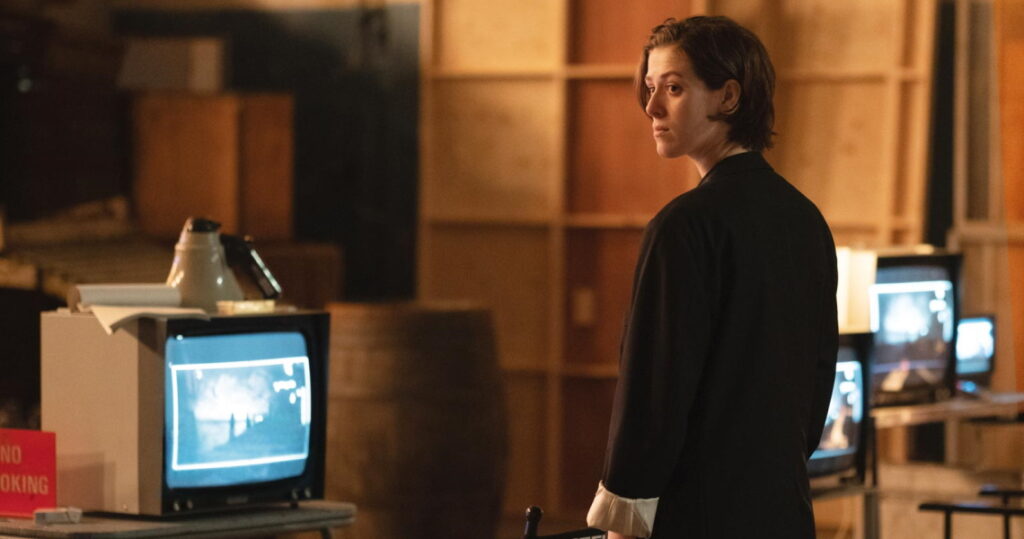
The Souvenir: Part II
Julie (Honor Swinton Byrne) is finally in charge behind the camera, but she’s not very good at a key part of the whole directing thing: giving direction. The film-school senior knows the actions of her ex, who’s just died of a drug overdose, but not how to explain the motivations behind them to the actor who’s playing an ostensible version of him. The deceased’s mystifying specter makes retelling the story of their relationship through her chosen artform that much more difficult, but the work is the only way she can learn to live with it. With The Souvenir: Part II, writer-director Joanna Hogg bests her original in nearly every aspect, more freely flowing through her pseudo-stand-in’s changing tides in a compassionate self-portrait of the artist as a young woman, a skilled person painfully working through inexplicable grief with remarkable intuition. (Joshua Ray) [Available soon to rent or purchase.]
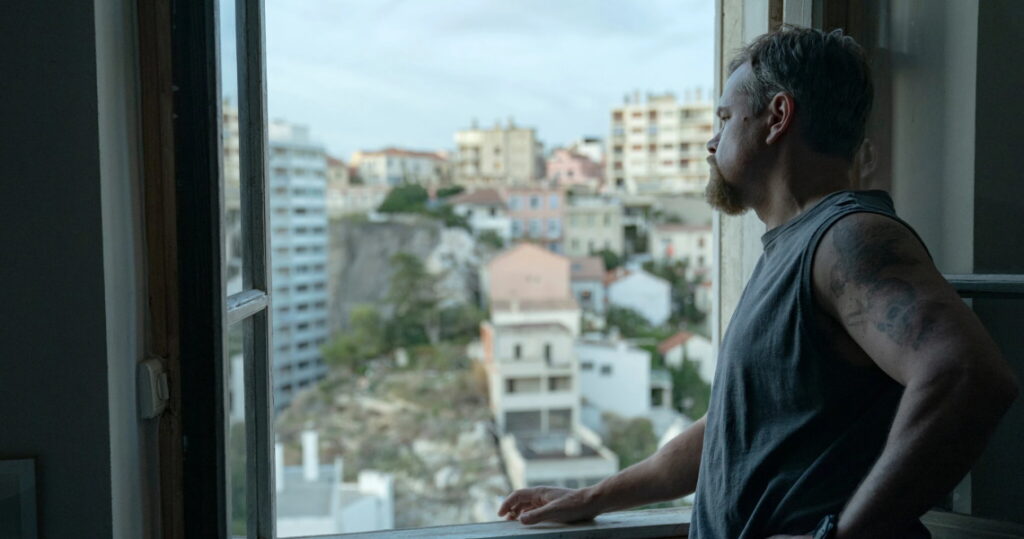
Stillwater
One of the year’s most overlooked surprises came in the form of a Matt Damon vehicle. Throughout its 140 minutes, Stillwater covers a plethora of complex themes and ideas that one would not typically expect from something that presents itself as another cookie-cutter entry in the vigilante-justice subgenre. In reality, it’s so much greater than that: an exploration of the effect revenge thrillers have had on the collective American consciousness, a condemnation of the modern justice system, a comment on the complexities of identity, a repudiation of American exceptionalism, and a reminder of all that unites us behind the enemy lines of the culture war. Director and co-writer Tom McCarthy continues to be a man of many hats, and his variation on both the fish-out-of-water trope and the vigilante-justice movie proves to be a remarkably nuanced thing due to the creative versatility he embodies. This isn’t the tasteless, narrow-minded action movie one would assume, about a white conservative hunting down an Arab teen to clear the name of his innocent American daughter. It’s a much more unruly, much more reflexive thing, and it’s all the better for it. (Kayla McCulloch) [Now available to rent on major online platforms.]

This Is Not a Burial, It's a Resurrection
It’s likely few observers could have predicted that one of the year’s great cinematic achievements would hail from the tiny south African nation of Lesotho, or that one of its finest performances would be delivered by an octogenarian actress who had also appeared in Beyoncé’s Black Is King. For his new feature, German-based director Lemohang Jeremiah Mosese weaves an enveloping, folkloric tale of resistance – against the rumbling juggernaut of progress, the consuming maw of entropy, and all the proud men who think they know what’s best. The brilliance of This Is Not a Burial, It’s a Resurrection is evident not just in how carefully Mosese has built his story around the hard-bitten presence of the late Mary Twala, but in how he transmutes this low-fi parable into a masterful Kubrickean nightmare – which then gives way to fearless triumph at its electric conclusion. (Andrew Wyatt) [Now available to rent on major online platforms.]
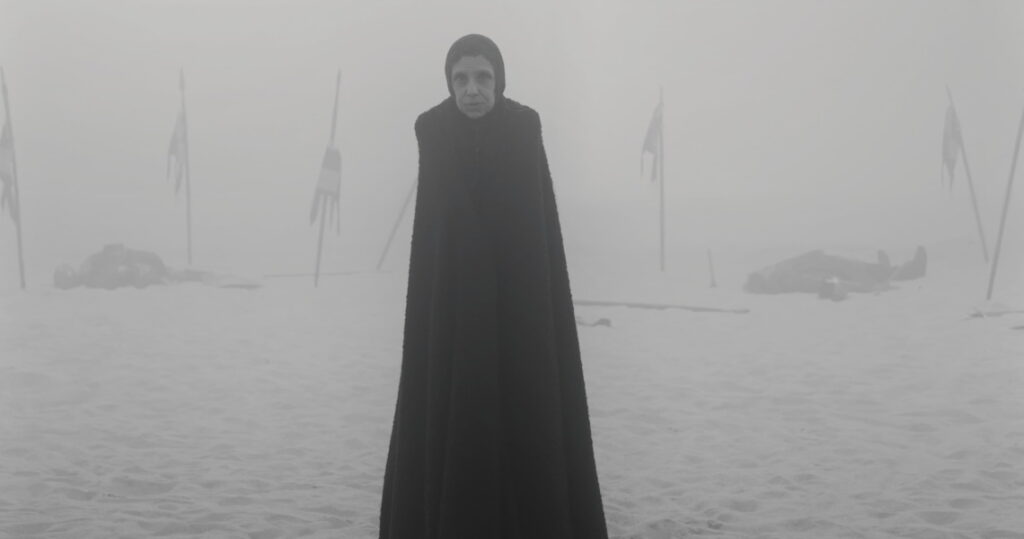
The Tragedy of Macbeth
While The Tragedy of Macbeth is the first official Shakespeare adaptation from a Coen brother, the truth is that director Joel has been toying with the Bard’s themes for the entirety of his filmmaking career. From Blood Simple (1984) to The Ballad of Buster Scruggs (2018), Coen and his brother Ethan have expertly balanced tragedy and comedy for decades now — it only makes sense that, for his first true solo venture, Joel would fully embrace one of his most trusted touchstones without hesitation. Even in a year that was jam-packed with all kinds of great dramas, the end result is an exceptional standout. With its inspired casting of Denzel Washington in the titular role and Frances McDormand as Lady Macbeth — ingeniously raising the ages of its central pair to great dramatic effect — and its stark, textured black-and-white cinematography that recalls Orson Welles’s Shakespeare adaptations, The Tragedy of Macbeth is the masterful work of a director who has officially kicked off his veteran era not with a whimper but with a bang. (Kayla McCulloch) [Now playing in select local theaters and available to stream on AppleTV+ on Jan. 14.]

The Velvet Underground
Velvet Goldmine (1998) refracted queer identity politics through Citizen Kane, except director Todd Haynes’ William Randolph Hearsts were David Bowie, Iggy Pop, and Brian Eno. The filmmaker’s I’m Not There (2007) found the locus of mid-20th-century American anxieties at the intersection of many – at least seven, at last count – Bob Dylans. With his latest cinematic mixtape, The Velvet Underground, Todd Haynes reiterates the raison d’etre of those previous semi-fictions for his first documentary outing. The titular group of artists is the ideal lens for examining the explosion of new pop, filmic, musical artforms and their epicenter of New York City in the 1960s. Ever the playful semiotician, Haynes (with due credit to his frequent collaborators Ed Lachman, Affonso Gonçalves, and Christine Vachon) collapses layers of far-out symbols and signposts into a joyful, kaleidoscopic vision of the inimitable movement that made Lou Reed and John Cale’s band possible and preeminent. (Joshua Ray) [Now available to stream on AppleTV+.]
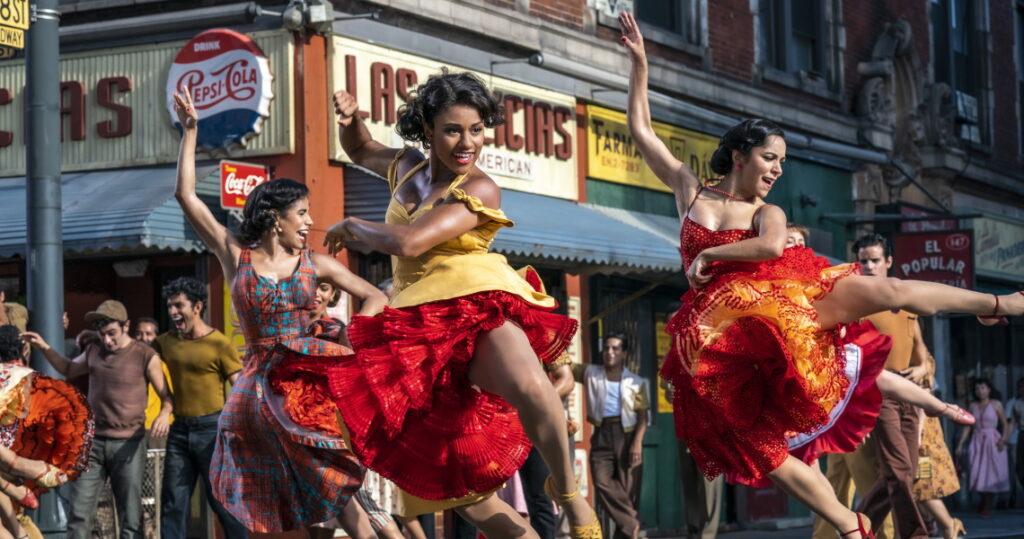
West Side Story
It shouldn’t be a hot take to say that each new Steven Spielberg movie automatically deserves the full attention of every person who says they love movies simply because it’s, well, a new Steven Spielberg movie. However, the unjust maligning of much of his adventurous (and frankly experimental) work from the 2010s has unfortunately made this the case. Spielberg’s take on West Side Story — which the capital-a Auteur said has been floating around in his head since he was 10 years old — is nothing short of miraculous, vital filmmaking, imbued with an energy and a kineticism filmmakers half Spielberg’s age could only dream of pulling off this well. Sure, one could brush off The BFG (2016), The Post (2017), or Ready Player One (2018), but to do the same for West Side Story would be a mistake. It’s some of the greatest, most exciting stuff to hit the big screen in 2021. (Kayla McCulloch) [Now playing in theaters everywhere.]
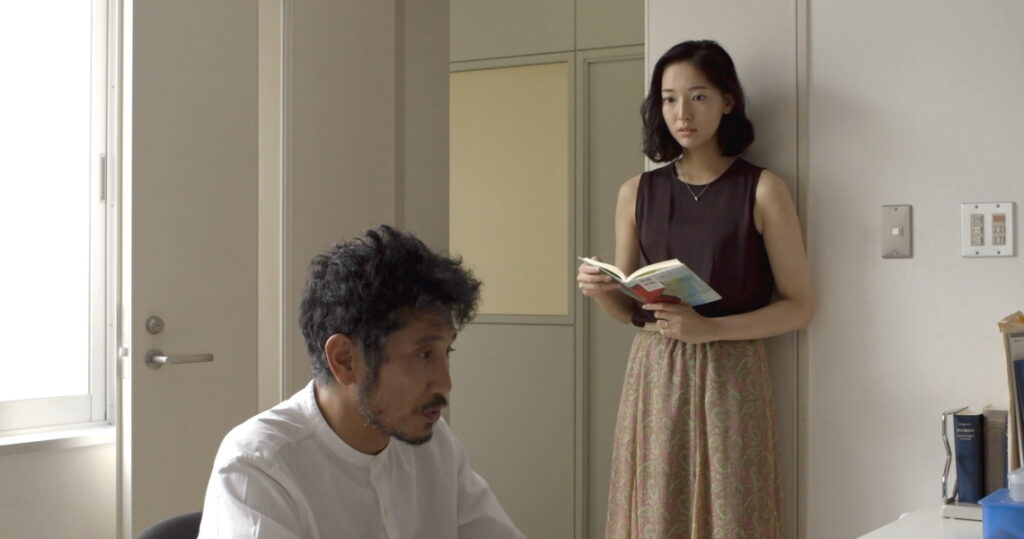
Wheel of Fortune and Fantasy
Wheel of Fortune and Fantasy was made by writer-director Ryûsuke Hamaguchi during a pandemic-forced break during the production of his other 2021 release, Drive My Car. In many ways, this triptych is the inverse of that epic grief tome – the latter comes from a short story in Haruki Murakami’s Men Without Women anthology and the former could easily be called Women Without Men – but their maker’s fingerprints are too indelible to go unnoticed. Hamaguchi’s three literary tales of lovelorn ladies showcase the emergent master’s penchant for dramatic irony, one with economically sketched characters made recognizable by their humane behavior and irrationality. Wheel may be smaller in scope than Car, but comparing them in those terms misses the point of Hamaguchi’s work entirely. People live through small gestures and small movements, and the accumulation of those are like the pieces of a puzzle that make up the picture of a life. (Joshua Ray) [Now available to rent from Film Movement.]
Kayla McCulloch's List
- Licorice Pizza
- The French Dispatch
- Some Kind of Heaven
- The Power of the Dog
- A Hero
- Procession
- West Side Story
- Days
- Bergman Island
- Cusp
- Drive My Car
- Playing with Sharks: The Valerie Taylor Story
- Stillwater
- The Tragedy of Macbeth
- C’mon C’mon
- The Woman Who Ran
- Memoria
- Our Friend
- Wheel of Fortune and Fantasy
- El Planeta
- Honorable Mentions: “All Too Well: The Short Film”; Barb and Star Go to Vista Del Mar; The Beatles: Get Back; Skies of Lebanon; What Would Sophia Loren Do?
Joshua Ray's List
- Drive My Car
- Memoria
- The Souvenir: Part II
- Petite Maman
- Licorice Pizza
- This Is Not a Burial, It’s a Resurrection
- The French Dispatch
- Wheel of Fortune and Fantasy
- Bergman Island
- The Velvet Underground
- Evangelion: 3.0+1.0 Thrice Upon a Time
- West Side Story
- In the Same Breath
- Parallel Mothers
- The Power of the Dog
- Tina
- Little Girl
- Labyrinth of Cinema
- Days
- Luca
- Honorable Mentions: All Light, Everywhere; Barb and Star Go to Vista Del Mar; Beginning; Benedetta; Candyman; El Planeta; Identifying Features; North by Current; Shiva Baby; Test Pattern; Titane; Wife of a Spy; Wojnarowicz: F**k You F*ggot F**ker; The Woman Who Ran.
Andrew Wyatt's List
- This Is Not a Burial, It’s a Resurrection
- Petite Maman
- The Power of the Dog
- Pig
- Identifying Features
- Days
- The Green Knight
- The Father
- Passing
- About Endlessness
- Drive My Car
- Shiva Baby
- The Souvenir: Part II
- Hit the Road
- Licorice Pizza
- Saint Maud
- Spencer
- The Lost Daughter
- The Velvet Underground
- Titane
- Atlantis
- The World to Come
- Limbo
- Tina
- C’mon C’mon
- Acasa, My Home
- Two of Us
- The Fever
- A Hero
- Mass
- Wheel of Fortune and Fantasy
- Dear Comrades!
- The Novice
- Preparations to Be Together for an Unknown Period of Time
- Dune
- There Is No Evil
- Faya Dayi
- Luca
- The Disciple
- Film About a Father Who
- Honorable Mentions: Anne at 13,000 Ft.; Bergman Island; Billie Eilish: The World’s a Little Blurry; Candyman; Derek DelGuadio’s In & Of Itself; Eyimofe (This Is My Desire); Flee; Hope; The Humans; I Care a Lot; In the Heights; Judas and the Black Messiah; The Killing of Two Lovers; The Last Duel; Lucky; Luzzu; The Matrix Resurrections; M.C. Escher: Journey to Infinity; Memoria; The Mitchells vs. The Machines; MLK/FBI; Nightmare Alley; Oxygen; A Quiet Place Part II; Quo Vadis, Aida?; Prayers for the Stolen; Pretend It’s a City; The Reason I Jump; Riders of Justice; Sisters with Transistors; Some Kind of Heaven; The Sparks Brothers; The Tragedy of Macbeth; The Vigil; What Do We See When We Look at the Sky?; White Lie; Wojnarowicz: F**k You F*ggot F**ker; The Woman Who Ran.
